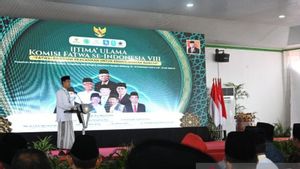Chairman of the Nahdlatul Ulama (PBNU) Executive Board Yahya Cholil Staquf emphasized that claims stating that all greetings in any religion are worship is inappropriate.
"Because there is a claim that assalamualaikum is worship, it is claimed that other greetings are also worship. Even though there is no worship. Ask Christian friends whether prosperous greetings are included in the liturgical (Christian worship)?" he said in a statement in Jakarta, Antara, Wednesday, June 12.
Gus Yahya, as he is familiarly called, assesses that the prosperous greetings that are often used in various religious traditions are not always considered as part of formal worship.
He emphasized that the use of greetings in speeches or meetings does not always mean worship, but can be a sign of inter-religious harmony.
"I ask the question, is it permissible to start a speech with an expression that is symbolically intended to show inter-religious harmony?", he said.
Gus Yahya clarified the greeting "Namo Buddhaya" which is often seen as worship in Buddhism.
According to him, Buddhism does not recognize the concept of worship in the theoretical sense as in other religions.
He emphasized that meditation is the main practice in Buddhism, not fighting against Gautama, which is only seen as a role model.
"Don't think that Buddhists worship Buddhism, no. Buddhists are just their thoughts considered role models by Buddhists. So if they are considered to mix worship, what worship is mixed?" he said.
Gus Yahya also highlighted the importance of changing mindset among ulama and Islamic thinkers about interfaith. He considered that most fiqh experts were still affected by the Turkish mindset of Utsmani and had not fully internalized the concept of the Unitary State of the Republic of Indonesia (NKRI).
"In the future, this will be crucial again because now various actors who are very strong are fighting to stream from ideas to become mindsets from the community," he said.
Gus Yahya invites all parties to think clearly and not get caught up in ideas that are unclear about their origins, so that it seems as if the idea is part of a religious fatwa.
"The idea that has unclear origins such as secularism can be part of a mainstreaming strategy that affects religious leaders and scholars to give approval, so it seems as if the idea is part of religion. This has been a long time, and we have to think clearly about it," he said.
SEE ALSO:
The English, Chinese, Japanese, Arabic, and French versions are automatically generated by the AI. So there may still be inaccuracies in translating, please always see Indonesian as our main language. (system supported by DigitalSiber.id)
Most Popular Tags
#Prabowo Subianto #golkar #Pilkada Dki #online gambling #Mount Lewotobi malePopular
16 November 2024, 03:00
16 November 2024, 04:00
16 November 2024, 04:47
16 November 2024, 05:00
















